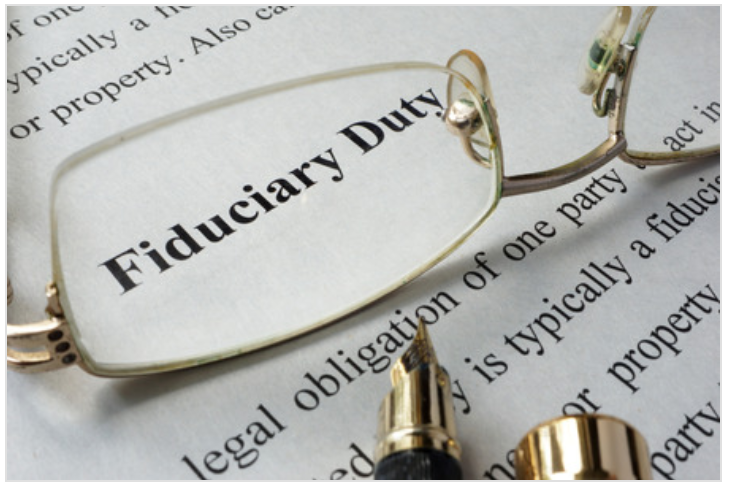 Suppose that a company whose board of directors that you sit on, or you are a significant owner or equity holder, or perhaps even with a personal guarantee for the company’s debt.
Suppose that a company whose board of directors that you sit on, or you are a significant owner or equity holder, or perhaps even with a personal guarantee for the company’s debt.
It is possible that not very long ago, the company’s financial condition was solid, but things have taken a turn for the worse and the company is insolvent or nearly so.
If you are a board of directors’ member, the first thing you should not do is to resign based on a knee jerk assumption that by doing so, you will relieve yourself of potential liability. That assumption is generally misguided, often very much so.
THE GOVERNING PRINCIPLES …
 The ordinary principles governing fiduciary duties apply whether a company is solvent or not: essentially, a director has a duty of loyalty and a duty of care to the company. And, simply stated, it is not that difficult to discharge both responsibilities in practice.
The ordinary principles governing fiduciary duties apply whether a company is solvent or not: essentially, a director has a duty of loyalty and a duty of care to the company. And, simply stated, it is not that difficult to discharge both responsibilities in practice.
Leaving aside the moral obligation you may have not to abandon a company when it needs you most, doing so just as things become discernibly bad is not typically the best strategy to sidestep potential liability.
If mistakes happened on your watch for which you bear some responsibility, leaving will not make a difference. Instead, leaving eliminates any chance of being part of a solution that alleviates the problem.
For these reasons, one seldom sees an experienced private equity professional, for example, resigning from the board of a financially distressed portfolio company, even one filing receivership or chapter 11.
A DIRECTOR’S DUTIES …
 While neither the extent of a director’s fiduciary duties nor the way courts judge whether those duties were fulfilled change due to the insolvency of a company, something important does change: the constituencies to whom you owe fiduciary duties.
While neither the extent of a director’s fiduciary duties nor the way courts judge whether those duties were fulfilled change due to the insolvency of a company, something important does change: the constituencies to whom you owe fiduciary duties.
You already know this on some level (at least you should if you serve on any company board), but as a reminder:
1. Directors owe fiduciary duties only to a solvent company’s equity holders.
2. Directors owe fiduciary duties only to an insolvent company’s creditors.
3. Writing more precisely, in both cases above, directors owe fiduciary duties to the company. Since the company’s residual (a/k/a beneficial or equitable) owners are its equity holders when the company is solvent and its creditors when the company is insolvent, the attorneys and courts tend to write and speak in shorthand in terms of duties being owed directly to whoever the company’s residual owners are.
4. Since solvency is often very hard to determine, courts developed a theory called the “zone of insolvency,” which is the gray area in which a company is right on the thin line between solvency and insolvency.
THE GENERAL RULE IS …
 The general rule is now that corporate directors need to do what is best for the company (i.e., the enterprise) itself, regardless of who the residual owners of the enterprise may be. Whether a company is insolvent is sometimes evident. And sometimes not.
The general rule is now that corporate directors need to do what is best for the company (i.e., the enterprise) itself, regardless of who the residual owners of the enterprise may be. Whether a company is insolvent is sometimes evident. And sometimes not.
Courts commonly answer the question by reference to:
1. Whether the company at issue can pay its debts as they normally come due (the cash flow test),
2. Whether the company’s assets are worth more than its liabilities (the balance sheet test), or
3. Whether the company is likely to survive in the normal course of business, considering reasonably anticipated business fluctuations over a reasonable time (the adequate or reasonable capital test).
WHAT SHOULD YOU DO?
So, what should your company do? At the risk of stating the obvious:
2. Review all business insurance policies
3. Review contracts for provisions that may excuse performance
4. Don’t hide your head in the sand
5. Don’t be too quick to throw in the towel
6. Don’t be afraid of saying “no.”
THE TIME TO WORK SMART …
 This last point warrants elaboration.
This last point warrants elaboration.
Some lenders, landlords, and other creditors may take very tough stances, making threats and demands. They may want more collateral. They may seek a personal guaranty where there was none before or the collateralization of a personal guarantee.
They may ask you to stand down for a friendly foreclosure. They may ask you to waive claims against them. They may even suggest you reach into your 401k (or other assets that creditors cannot seize) to pay them.
Just say no, at least until you retain an experienced corporate restructuring advisor. And remember, agreeing to nothing is not equivalent to doing nothing.
Get smart about the general topic of corporate restructuring, insolvency, and bankruptcy.
Seek out an experienced corporate restructuring advisor with whom you feel comfortable.
 And make sure you understand your options and understand the legal landscape enough to avoid making fundamental mistakes that could cost you dearly.
And make sure you understand your options and understand the legal landscape enough to avoid making fundamental mistakes that could cost you dearly.
Commercial lenders are (generally) rational actors. They typically understand (and even commonly prefer) that their defaulting borrowers be adequately represented.
Revitalization Partners specializes in improving the operational and financial results of companies and providing hands-on expertise in virtually every circumstance, with a focus on small and mid-market organizations. Whether your requirement is Interim Management, a Business Assessment, Revitalization and Reengineering, a State Receivership or Bankruptcy Support, we focus on giving you the best resolution in the fastest time with the highest possible return.



